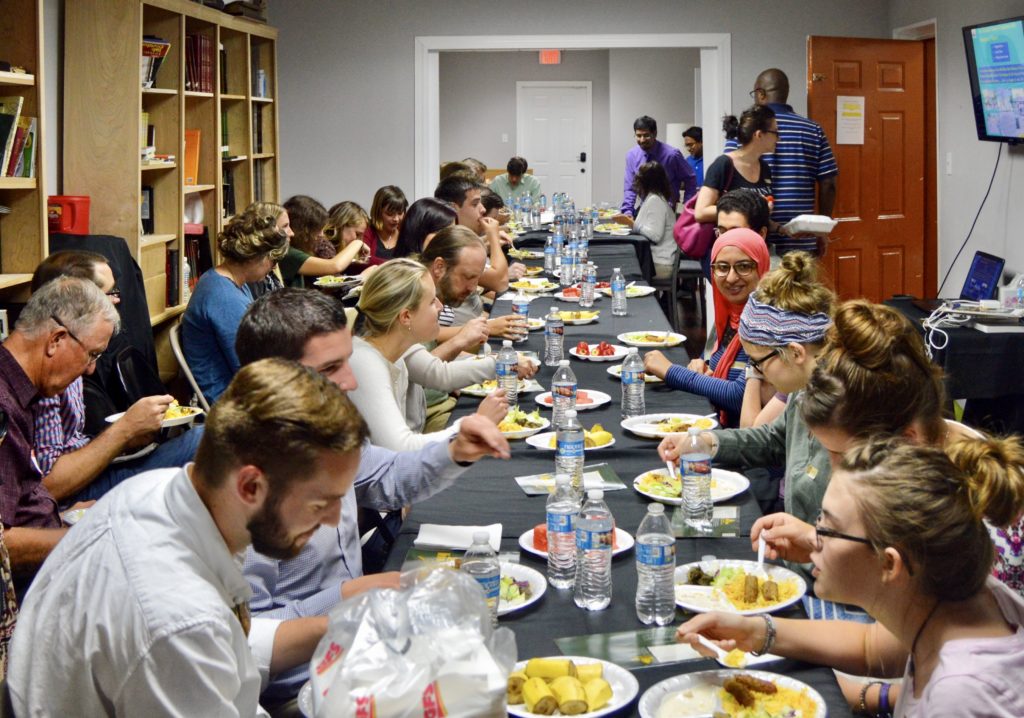
We’re well into the month of Ramadan. In Middle Tennessee, that typically looks like hands-on volunteering, breaking fast with neighbors, and opening the doors of local mosques for non-Muslims to learn about the religion. So, members of the faith have found new ways this year to celebrate the holiday in quarantine.
Sarah Alzabet won’t lie to you. Things this Ramadan haven’t been the way they usually are — the way they’re supposed to be.
“It’s really, really different,” Alzabet says. “I’ve adapted, and I know how this month is going to go now because, in the beginning, it just felt weird.”
Ramadan is traditionally a time to grow closer to God, with the community, and with oneself. Muslims fast and do acts of service, read the entirety of the Quran with their mosques and celebrate God revealing the first verses of the holy book to the Prophet Muhammed. Each night, after the sun goes down, Muslim families and friends gather for iftar — the breaking of the fast — and then, they usually gather up with the rest of the congregation.
“The mosque during Ramadan is going to be fullest that you will ever see it during the whole year,” Alzabet says. “Every night, we have this prayer, it’s called tarawih, and this is like a group prayer.”
Tarawih is long — well over an hour — so mosques aren’t required to say the whole thing. But, Alzabet says, it’s what she misses most while observing Ramadan at home with her family in Murfreesboro.
Plus, she misses the moments afterward.
“Especially the younger people, that would be the time for us to talk about the day — like, what we did that day — and then, that’s when we would give into our cravings that we had during the day. Like, if McDonald’s was still open, we’d go get McDonald’s after tarawih,” she says, laughing.
19-year-old Alzabet is a board member for Murfreesboro Muslim Youth. The group formed as a service organization to honor the three Muslims killed in the 2015 Chapel Hill shooting, who were all known for their service in the community. The group’s extra volunteering efforts for Ramadan are still happening, but they’ve had to be modified for these socially distant times.
“We’re still doing the homeless self-care kits,” Alzabet says. “Usually, we would pick a day, and we would all meet a few hours before iftar. And, we would all make the self-care kits together, and we’d break our fast together. But, obviously now, since we can’t do that, one of our youth took on that activity.”
‘Different times, different perspective’
Rashed Fakhruddin is also having to change the holiday plans at the Islamic Center of Nashville. In some ways, that’s been positive. Fakhruddin is ICN’s director of community partnerships, which means Ramadan, for him, is often spent coordinating activities at the mosque and not really having time for the reflection the holiday calls for.
“It’s definitely different times with the coronavirus and staying at home, but it’s also allowed a different perspective on connecting with family,” Fakhruddin says. “It’s actually a joy to be able to spend time in a common cause together.”
But, there are some things missing this year, like the interfaith aspect of the holiday on a local level. West End Synagogue reached out to ICN last year and offered to sponsor one of the mosque’s community iftars. They wanted to do the same this year but came up with a safer alternative — a joint gift to charity.
“Rabbi Joshua Kullock reached out and said, ‘What can we do?’ and our imam, Sheikh Ossama, replied, ‘Why don’t we do a joint venture and feed those people in the medical profession who are actually on the frontline?'”
The temple and the mosque are now donating meals through Feed the Front Line Nashville. In a way, it’s a parallel to how elderly or sick Muslims are supposed to observe Ramadan. They don’t have to fast like everyone else, but instead, they’re encouraged to eat a meal and then give a meal to someone else in need.
That kind of looking out for one another is what drew Ryan White to the faith. White was a graduate student at Vanderbilt University — and a three-year captain for the Commodores football team — when he toured ICN for the first time.
“I started reading books,” White says. “I read the autobiography of Malcom X and that kind of educated me on my people as a black man and how we were brought up and where we come from.”
White reached out to Fakhruddin, an avid Vandy fan who’d kept in touch after White’s visit to the mosque. And, eventually, White converted to Islam. Last year was his first Ramadan, which he celebrated mostly alone since the rest of his family are practicing Christians.
“It was just an adjustment for me because I had never did anything like that before. It helped me become more disciplined. It helped me be able to sit and be with my thoughts and being uncomfortable, I guess you could say,” he recalls.
“Being comfortable with being uncomfortable was really the feeling I got from my first Ramadan.”
White says he doesn’t mind the solo celebration again this year. There’s a language barrier and knowledge gap many converts face at first. Down the road, White does hope for a Ramadan with friends and the community at the mosque again, but for now, he’s focusing on connecting with God — on bettering himself.

